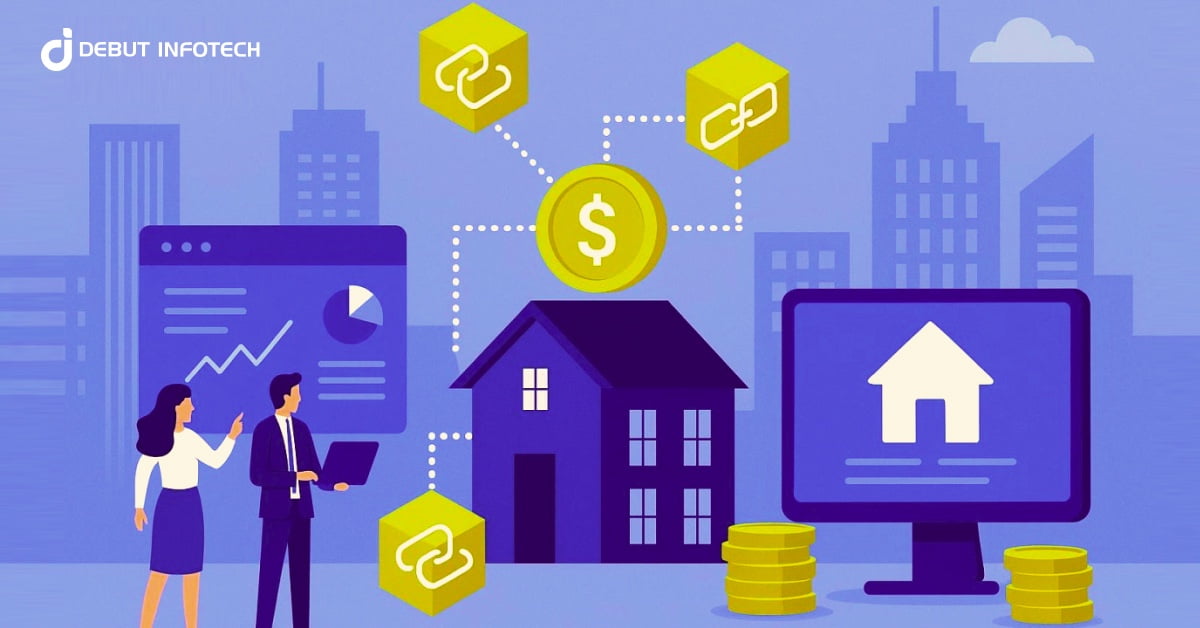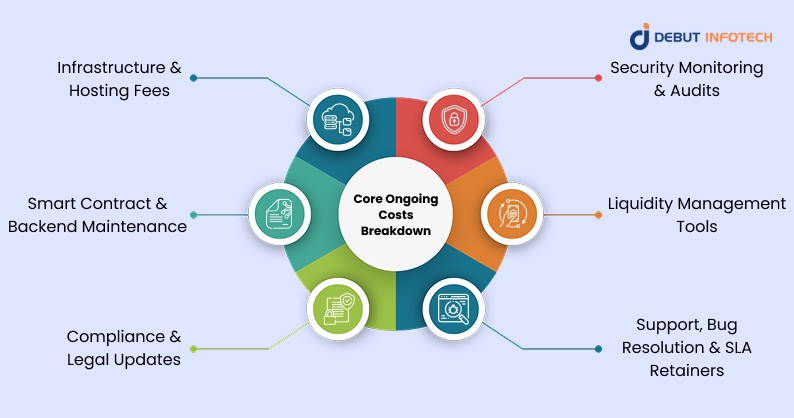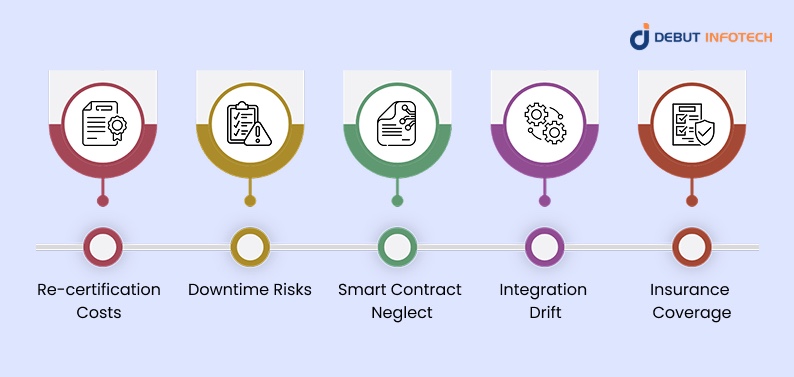Table of Contents
Home / Blog / Tokenization
Ongoing Costs After Launching a White Label Real Estate Tokenization Platform
September 10, 2025

September 10, 2025
Launching a white label tokenization platform for real estate marks a significant achievement. It equips companies, property owners, and investors with an efficient way to divide assets fractionally. This not only enhances liquidity but also attracts global investors. A white label tokenization platform improves time-to-market compared to building one from the ground up. It also supports flexible branding and feature customization. These platforms are popular with real estate companies because they reduce initial investment and accelerate time-to-market. Platforms like this are an excellent gateway to the expanding digital asset ecosystem.
However, there’s a misconception. People often assume that once their platform is launched, the expenses stop. Instead, the launch is just the beginning. A white label asset tokenization platform needs ongoing funding. This comprises hosting, adherence to regulations, smart contract updates, security checks, and customer service.
Even a top-notch tokenization platform faces the risk of compliance, user trust, and performance. This blog will outline the ongoing costs to expect. It will also explain how to leverage these costs to fuel growth instead of viewing them as a loss.
Maximize Your Real Estate Tokenization Potential
Don’t let hidden costs slow your growth. Partner with experts who can help you plan, optimize, and scale your tokenization platform with confidence.
One-Time vs. Ongoing Costs: Knowing the Difference
Before diving into the ongoing expenses, it’s important to distinguish between launch costs and recurring costs. Launch costs typically cover the one-off setup needed to make your white label tokenization product market-ready. These include UI/UX design, initial smart contract deployment, wallet integration, and a minimum viable product (MVP) delivery. You may also incur fees for branding, licensing, and initial regulatory consultation at this stage.
The moment you go live, your platform transitions into a new phase—operations and scale. Recurring costs begin to accrue during this time. No matter how large, one-time investments differ from ongoing expenses like infrastructure hosting, which recur monthly, quarterly, or annually. Ongoing expenses include compliance updates, bug fixes, customer support, liquidity management, and periodic security audits. Ignoring any of these can lead to a breakdown in platform stability and expose the company to legal and reputational risks.
One-Time Costs:
These are upfront investments needed to bring your white label tokenization platform to life. They often cover:
- UI/UX Design: Crafting a professional, user-friendly interface that builds trust and ensures smooth investor onboarding.
- Initial Smart Contract Deployment: Developing and auditing the foundational contracts that govern token issuance, trading, and compliance logic.
- Wallet Integration: Ensuring seamless connectivity with digital wallets for storing and transacting tokens.
- MVP Delivery: Creating a minimum viable product validates your idea, helps attract early adopters, and secures investor confidence.
- Branding & Licensing: Establishing your identity in the market and obtaining relevant legal approvals.
- Initial Regulatory Consultation: Engaging legal experts to align your platform with the jurisdictions you plan to operate in.
These one-off expenses are crucial to get your project off the ground, but they don’t guarantee sustainability beyond the launch phase.
Ongoing Costs:
Once the platform is live, you enter a new phase—operations and scale. This is where recurring costs dominate. They can occur monthly, quarterly, or annually, and skipping them can be far riskier than underinvesting in setup. Examples include:
- Infrastructure Hosting: Your platform relies on cloud servers, bandwidth, and storage to stay live 24/7. Even minor downtime can erode investor trust and trading activity without stable hosting.
- Compliance Updates: Laws and regulations change frequently, requiring constant adjustments. Staying compliant through recertifications and AML/KYC checks prevents costly penalties and protects your reputation.
- Bug Fixes & Upgrades: Every platform encounters technical glitches over time. Regular updates and patches ensure smooth functionality and a user-friendly experience.
- Customer Support: Investors expect quick answers when issues arise. Having a responsive team or AI chatbot builds trust and keeps users engaged.
- Liquidity Management: Healthy token trading depends on balanced supply and demand. Active liquidity strategies ensure tokens remain attractive and easily tradable.
- Security Audits: Cyber threats evolve constantly, putting platforms at risk. Periodic audits identify vulnerabilities early and prevent costly breaches.
The key difference? One-time costs get you to market, while ongoing costs keep you in the market. Neglecting the latter can lead to downtime, investor distrust, or regulatory penalties, undermining all the effort and capital spent on launch. A smart founder will always budget for both categories, with extra buffer room for unexpected recurring expenses.
Related Read: AI Agents for Real Estate Success: A Complete Guide
Core Ongoing Costs Breakdown

The success of real-world asset tokenization depends on sustaining performance, compliance, and trust. Below are the major categories of ongoing costs associated with a white label real estate tokenization platform.
Infrastructure & Hosting Fees
Every digital platform relies on infrastructure, and tokenization platforms are no different. Your white label tokenization platform must be hosted securely on cloud providers such as AWS, Microsoft Azure, or Google Cloud Platform. These services deliver the computing power needed to support token creation, transaction processing, and investor dashboards.
Costs here scale with your user base and transaction load. Expect to pay anywhere from $200 to $2,000 per month depending on whether your platform serves a small regional investor pool or a global audience. Add-ons like load balancers, payment tokenization, firewalls, and uptime monitoring ensure stability and reduce downtime risks. Skimping on hosting could lead to outages, affecting investor confidence and long-term adoption of your tokenization platform.
Smart Contract & Backend Maintenance
Smart contracts are the backbone of token development and asset tokenization. But they are not “write once and forget.” Laws evolve, bugs emerge, and new functionalities may need to be integrated. Regular patching, re-audits, and upgrades ensure your contracts remain secure and compliant.
Beyond smart contracts, backend systems—such as APIs, investor dashboards, and transaction records—require continuous optimization. As more investors join, scaling performance becomes vital. Maintenance contracts or service-level agreements (SLAs) with developers typically cover these updates. Costs vary depending on whether you employ an in-house team or rely on external RWA tokenization companies, but expect a consistent monthly or hourly expenditure to maintain quality.
Compliance & Legal Updates
One of the most critical ongoing costs is compliance. Real estate tokenization platforms operate in a heavily regulated environment, with rules shifting regularly across jurisdictions. Whether your project is in the U.S., Europe, Asia, or the Middle East, you must adapt to changing securities laws, anti-money laundering (AML) rules, and Know Your Customer (KYC) mandates.
Subscriptions to compliance tools like Chainalysis, Sumsub, or equivalent providers help automate KYC/AML verification. These typically cost $300 to $1,500 per month depending on volume. Legal consultations, licenses, and regulatory filings add another layer of recurring expenses. Without proactive compliance, your platform risks fines, shutdowns, or investor withdrawal.
Security Monitoring & Audits
Security remains one of the most expensive yet indispensable areas of ongoing costs. A breach in your white label asset tokenization platform could result in financial losses, regulatory penalties, and irreparable reputational harm. That’s why continuous monitoring tools for API calls, transaction anomalies, and wallet activities are non-negotiable.
Additionally, regular penetration testing and smart contract audits are critical. While one-off audits may cost $1,000 to $10,000 annually, most platforms schedule quarterly checks to stay ahead of evolving threats. This investment safeguards the trust investors place in your platform and ensures compliance with international data protection standards.
Liquidity Management Tools
Liquidity is essential for a functioning secondary market. Without it, even the most innovative real world asset tokenization project loses investor appeal. Maintaining liquidity requires tools such as automated market makers (AMMs), rebalancing mechanisms, or even partnerships with external liquidity providers.
Some projects employ fund tokenization models where liquidity pools are maintained for investor redemption. Others may implement token buyback or reserve strategies. These costs vary significantly and are often performance-based, but they are indispensable for creating a seamless investor experience.
Support, Bug Resolution & SLA Retainers
Finally, no platform survives without robust support. A real estate tokenization company must maintain a customer success team and a technical support pipeline to address bugs, handle investor queries, and provide SLA-bound guarantees.
Basic support may be covered by email and ticketing systems, but premium plans involve dedicated account managers or even an entire outsourced developer team. Costs range from $1,000 to $5,000 per month, depending on the scope and responsiveness required. These costs may seem high, but they ensure smooth operations and sustained investor satisfaction.
Also Read: Top 6 Challenges in RWA Tokenization
Optional Growth-Stage Add-Ons
Beyond the essential costs needed to keep your white label tokenization platform running, optional growth-stage add-ons become increasingly important as your platform scales. These investments may not be required on day one. Still, they are critical in accelerating adoption, improving user experience, and ensuring your platform remains competitive in a fast-evolving tokenization market.
Marketing & SEO for Token Listings
Once your platform is live, visibility is everything. Strategic marketing campaigns and strong SEO efforts ensure your tokens and marketplace stand out in an increasingly crowded space. This includes listing your tokens on global exchanges, running digital ad campaigns, leveraging content marketing, and optimizing search presence around keywords like “real estate tokenization platforms” or “fund tokenization.” The stronger your online visibility, the faster you attract investors, issuers, and liquidity providers.
User Onboarding Automation
Smooth onboarding is one of the biggest differentiators between a platform that scales and one that struggles with retention. Investing in CRM integration, automated email triggers, and guided KYC/AML verification flows helps ensure new users have a seamless first experience. This reduces friction for investors and builds long-term trust in your platform. Advanced automation tools can segment users and personalize engagement based on their investment preferences.
Localization for Global Reach
Tokenization platforms often attract a global audience of investors. To meet this demand, localization becomes a growth-stage necessity. Adding multi-language support, handling multiple currencies, and ensuring compliance with diverse jurisdictional requirements make your white label asset tokenization platform more inclusive. This is particularly important for expanding into fast-growing regions where regulatory frameworks differ but investor interest is strong.
Blockchain Expansion
Most real world asset tokenization platforms, often Ethereum or Polygon, start with one blockchain. However, integrating support for additional blockchains becomes a competitive advantage as the industry evolves. Expanding into ecosystems focused on AI tokenization, NLP tokenization, and credit carbon tokenization can unlock new use cases and investor pools. For example, an RWA tokenization company may begin with real estate and later branch into equity tokenization, gold tokenization, or even climate-linked assets. Each new integration adds utility, resilience, and market appeal to the platform.
While these growth-stage add-ons are optional, they are often the difference between maintaining a static platform and building a dynamic ecosystem that scales globally. They position your tokenization solution as not just functional but future-ready, capable of adapting to new markets, regulations, and investor demands.
Hidden Costs Most Founders Overlook

Many founders underestimate hidden costs, which can disrupt operations if not budgeted for. While direct expenses like hosting or compliance are expected, the less-visible costs often cause the most damage over time.
- Re-certification Costs: As global regulations around real world asset tokenization evolve, your platform may require re-certification or new licensing. These processes can bring unexpected legal fees, external audits, and consultancy expenses, which—if unplanned—strain operating budgets.
- Downtime Risks: Hosting issues or expired SLAs may lead to outages that disrupt investor token access. Even short downtime can cause significant reputational damage, loss of trust, and reduced liquidity for listed assets. Proactive monitoring and redundancy planning are, therefore, critical ongoing expenses.
- Smart Contract Neglect: Smart contracts drive the automation behind token issuance, compliance, and transactions. If neglected, outdated contracts may expose vulnerabilities that hackers exploit. Addressing these incidents after the fact often costs more than routine upgrades and audits, including legal liabilities and investor reimbursements.
- Integration Drift: Over time, your platform may integrate with exchanges, payment gateways, or external KYC providers. As these services update their APIs or security standards, integration maintenance becomes an ongoing hidden cost to avoid disruptions.
- Insurance Coverage: Many founders overlook cyber liability insurance or investor protection insurance. These policies may not be mandatory, but in high-value tokenization platforms, skipping them exposes you to substantial financial and legal risk in case of system failure or breach.
These hidden costs underscore why ongoing investment in sustaining real estate tokenization platforms is necessary, not a luxury. Proactively budgeting for them ensures long-term stability, investor trust, and scalability of your white label tokenization platform.
Related Read: How to Reduce Risk Management in RWA Tokenization
How Debut Infotech Helps Reduce Long-Term Costs
This is where working with the right partner makes all the difference. Debut Infotech, a leading real estate tokenization company, offers robust support beyond the initial launch. With its scalable architecture, it helps optimize cloud hosting and reduce unnecessary infrastructure costs.
Debut Infotech also provides proactive smart contract monitoring and maintenance, ensuring your platform evolves with changing regulations. Their optional Annual Maintenance Contracts (AMC) include security monitoring, bug resolution, and compliance updates—all designed to reduce long-term operational costs. Additionally, their regulatory tracking dashboards help businesses stay compliant across multiple jurisdictions, a key differentiator in a rapidly shifting legal environment.
Stay Ahead with Smart Tokenization Strategies
From compliance to security, ongoing investment is the key to success. Let us guide you in building a sustainable, future-ready real estate tokenization business.
Conclusion
Building a white label tokenization platform is only the first step. The real journey begins after launch, when recurring costs come into play. These ongoing investments are essential for maintaining security, performance, and investor trust, from hosting and compliance to liquidity management and technical support. Many of these expenses may feel invisible, but they play a direct role in protecting your platform’s sustainability and growth potential.
Debut Infotech helps businesses overcome these challenges by offering scalable architecture, proactive monitoring, and comprehensive post-launch support. Instead of treating ongoing costs as a burden, consider them an investment in long-term stability and growth. Contact Debut Infotech today to estimate your post-launch roadmap and build a cost-efficient, future-ready RWA tokenization stack.
Frequently Asked Questions
Q. What is a white label tokenization platform?
A white label tokenization platform is a ready-made solution that allows businesses to tokenize assets—like real estate, equity, or funds—without building technology from scratch. It comes with customizable branding, compliance modules, and blockchain integration, reducing both time and cost to launch.
Q. What are the main ongoing costs after launching a tokenization platform?
The biggest recurring expenses include regulatory compliance, platform maintenance, transaction processing, security monitoring, and customer support. Depending on growth, you may also need to invest in marketing, liquidity management, and blockchain upgrades.
Q. Do tokenization platforms require ongoing compliance checks?
Yes. Real estate tokenization platforms must continuously comply with KYC, AML, and securities regulations. Regular audits, reporting tools, and updated compliance features ensure your platform operates legally across different jurisdictions.
Q. Can I expand beyond real estate with a white label tokenization solution?
Absolutely. While many companies start with real estate, the same infrastructure can be adapted for equity tokenization, fund tokenization, gold tokenization, credit carbon tokenization, and even AI-driven use cases like data tokenization or NLP tokenization.
Q. How do optional add-ons impact the total cost of ownership?
Optional add-ons like marketing campaigns, onboarding automation, multi-language support, and blockchain expansion increase costs but significantly boost competitiveness. These features enhance investor trust, global reach, and overall user experience.
Q. What role does blockchain expansion play in ongoing costs?
Supporting additional blockchains—such as Ethereum, Polygon, or specialized ecosystems for RWA tokenization—requires integration, testing, and security upgrades. Each new blockchain adds infrastructure costs but also opens access to broader investor pools.
Q. Is outsourcing platform management to an RWA tokenization company cost-effective?
Yes, in many cases. Partnering with an experienced real estate tokenization company or RWA tokenization provider can reduce internal overhead by handling security, compliance, updates, and even liquidity management. This ensures predictable ongoing costs while keeping the platform scalable.
Talk With Our Expert
Our Latest Insights
USA
Debut Infotech Global Services LLC
2102 Linden LN, Palatine, IL 60067
+1-708-515-4004
info@debutinfotech.com
UK
Debut Infotech Pvt Ltd
7 Pound Close, Yarnton, Oxfordshire, OX51QG
+44-770-304-0079
info@debutinfotech.com
Canada
Debut Infotech Pvt Ltd
326 Parkvale Drive, Kitchener, ON N2R1Y7
+1-708-515-4004
info@debutinfotech.com
INDIA
Debut Infotech Pvt Ltd
Sector 101-A, Plot No: I-42, IT City Rd, JLPL Industrial Area, Mohali, PB 140306
9888402396
info@debutinfotech.com



Leave a Comment